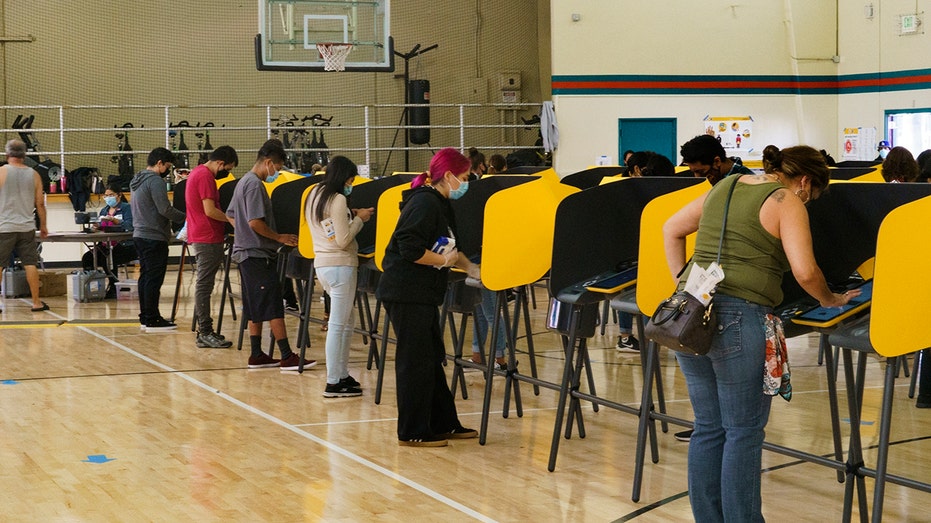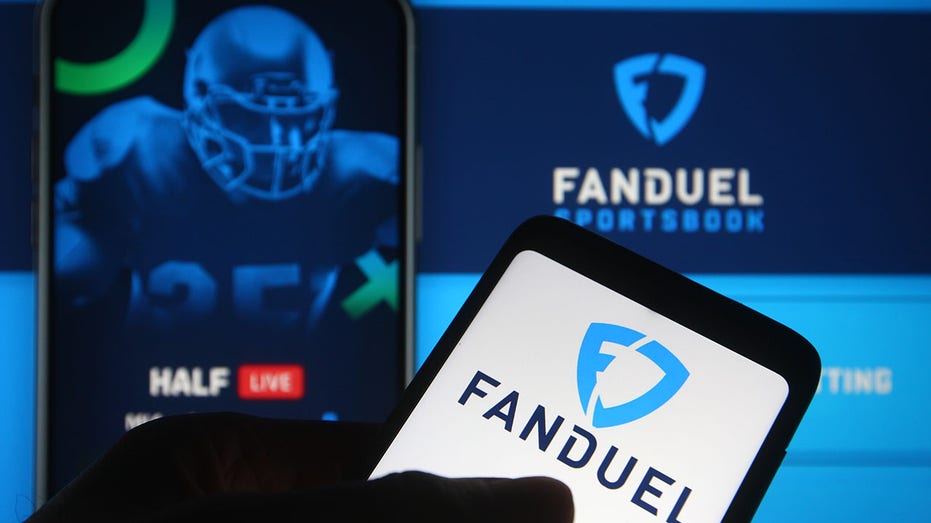Betting on elections could return to US in time for midterms, if regulators approve
Kalshi, which allows users to buy contracts on another moon landing and hurricanes hitting major cities, is seeking approval for political bets
Derivatives exchange Kalshi Inc. is ready to let users bet on next month’s midterm Congressional election, with a timer on its website counting down the days, hours and minutes until the first U.S.-based election-betting market goes live.
But the plan carries an asterisk: "pending regulatory approval."
The Commodity Futures Trading Commission, which regulates derivatives, has set an informal Friday deadline for deciding whether to approve a Kalshi request to list options related to the partisan control of Congress.

Voters fill out ballots on Election Day inside the Ruben F. Salazar Park recreation center, Tuesday, Nov. 3, 2020, in Los Angeles. (AP Photo/Damian Dovarganes)
ONLINE SPORTS BETTING SEES HUGE BUMP FROM LAST YEAR, INDICATING A BUSY YEAR AHEAD
Kalshi and its backers say that the proposed contracts would be safer for users than foreign venues for election betting, and that they would produce useful information for political scientists. Others point out that betting on elections is illegal in many states, worry about giving citizens a financial incentive to cast their votes for certain candidates and warn that political insiders could use the contracts to profit on nonpublic information.
Kalshi plans to offer options contracts whose value would fluctuate between $0.01 and $0.99 based on Republicans’ or Democrats’ odds of capturing control of either the House or the Senate.
Betting on elections was widespread in the U.S. before World War II, sometimes exceeding the volume of stock trading, according to a 2004 paper by economists at the University of North Carolina at Chapel Hill. The activity tapered off after the 1940s as some states outlawed it and newspapers began to rely more on public-opinion polling to predict election results, they said.

In this photo illustration the FanDuel logo of a sports betting company is seen on a smartphone. The last few years have seen a tremendous rise in sports betting, and gambling in general. (Pavlo Gonchar/SOPA Images/LightRocket via Getty Images / Getty Images)
DRAFTKINGS SHARES JUMP ON ESPN BRAND PARTNERSHIP REPORTS
Political betting now mainly takes place with sportsbooks located outside the U.S. Kalshi’s request to operate a regulated market comes as sports betting and other forms of gambling have come to many more states, and shortly after an explosion of speculative trading by small investors during the pandemic.
Financial regulators have been wary of allowing contracts based on election outcomes. Federal law directs the CFTC to prohibit so-called event contracts involving "war, terrorism, assassination or gaming or any activity" that violates federal or state laws, or is against the public interest.
"This is a classic example of the intersection between technology disruption and financial markets," CFTC Chairman Rostin Behnam said Monday at a conference held by the Securities Industry and Financial Markets Association Of election-betting contracts, he said, "Some people are trying to push the envelope." He didn’t go into further detail or mention Kalshi.
Existing Kalshi contracts this week allowed investors to bet on a moon landing happening by Jan. 1, 2025, for 11 cents on the dollar, a hurricane hitting Miami this year for 6 cents, and monkeypox being named a pandemic this year for 3 cents, among other things.

A SpaceX Falcon 9 rocket lifts off from pad 39A at the Kennedy Space Center in Cape Canaveral, Fla., Wednesday, April 27, 2022. NASA astronauts Kjell Lindgren, Robert Hines, and Jessica Watkins, and European Space Agency astronaut Samantha Cristofore (AP Photo/John Raoux / AP Newsroom)
INDUSTRIES CONTRIBUTE TO PACS; HERE'S HOW FIVE DISTRIBUTE IT AHEAD OF THE MIDTERMS
Kalshi says the CFTC should allow election betting to be offered by a U.S.-registered entity. Company founder Tarek Mansour said the proposed election contracts would allow individuals and small businesses to transfer the financial risk they face from a negative election outcome to investors willing to assume it.
"It would be illegal to block these contracts," Mr. Mansour said in an interview, citing several written opinions from lawyers. "We’re keeping all options open."
Funded by a pool of prominent investors including Sequoia Capital and Charles R. "Chuck" Schwab, Kalshi won approval from the CFTC to run a derivatives exchange in late 2020. Though legally registered as derivatives, Kalshi’s contracts differ from the crude-oil futures an airline might use to hedge against higher fuel prices, or from the interest-rate swaps that banks buy and sell.
While traditional derivatives are often prohibitively expensive for individual investors to trade, Kalshi’s contracts are cheap. Its website advertises that it takes just three minutes for users to sign up for trading, and the exchange establishes a maximum position of $25,000 per participant.
Previous attempts to bring election contracts onto regulated financial markets have struggled in recent years.
In 2012, the CFTC shut down a bid by the North American Derivatives Exchange, or Nadex, to let investors bet on the outcome of presidential elections and the composition of the House and Senate. At the time, Commissioner Bart Chilton questioned the contracts’ economic utility, and said he worried they could turn regulated markets into "some entertainment gambling orgy endeavor."
In August, the CFTC revoked permission for Victoria University of Wellington, in New Zealand, to operate a U.S. election-betting market known as PredictIt. The university had proposed to run the market on a small-scale, not-for-profit basis, and to use the information gathered for educational and research purposes. The CFTC alleged that the university wasn’t complying with the terms it had agreed to abide by and ordered it to close the contracts by Feb. 15, 2023.
Arguments about whether the CFTC should allow Kalshi’s proposed election contracts center on two questions: whether they fall into one of the agency’s prohibited categories, and whether they are against the public interest.
The CFTC has no definition of "gaming." But Better Markets, a financial-regulation advocacy group that opposes Kalshi’s bid, wrote in a comment letter that the Unlawful Internet Gambling Enforcement Act of 2006 defines a bet or wager as "the staking or risking by any person of something of value upon the outcome of a contest of others."
CLICK HERE TO GET THE FOX BUSINESS APP
Other observers encouraged the CFTC to approve them.
"Elections have consequences, and these consequences directly create risk that can be hedged, and are factored into pricing commodities, financial assets, and services," wrote Brazilian billionaire investment banker Jorge Paulo Lemann in a comment letter.




















